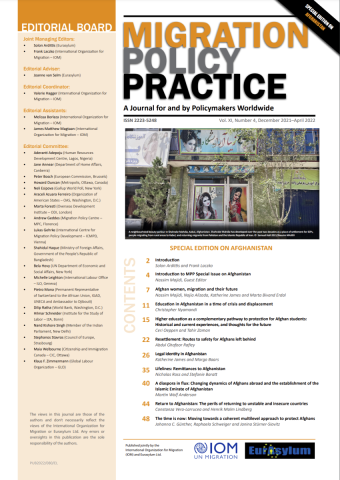Library
Migration Policy Practice (Vol. XI, Number 4, December 2021–April 2022)
The world is watching a full-fledged attack on human rights in Afghanistan – from mobility rights to women’s rights. The response has largely been to “wait and see”, which the Afghan population is feeling. The chaos of the last two weeks of August 2021, when the world’s attention was focused on evacuations at Kabul International Airport, the last point of exit, has turned nine months later into silence. But it does not have to be that way; Afghans can be supported in a multitude of ways to access their rights and to access protection.
Guest edited by Nassim Majidi, this Special Issue on Afghanistan offers nine articles that explore a range of safe protection pathways that governments, universities and the diaspora can rally behind. It serves as a reminder that while Afghans must be protected at home and abroad, and must not be forgotten, the international community’s promises of operationalizing humanitarian corridors, funding and designing legal pathways to protection must be delivered.
Authors in this special edition of Migration Policy Practice include Nassim Majidi, Najia Alizada, Katherine James, Marta Bivand Erdal, Christopher Nyamandi, Ceri Oeppen, Tahir Zaman, Abdul Ghafoor Raifey, Margo Baars, Nicholas Ross, Stefanie Barratt, Martin Wolf Anderson, Constanza Vera-Larrucea, Henrik Malm Lindberg, Johanna C. Günther, Raphaela Schweiger, and Janina Stürner-Siovitz.
